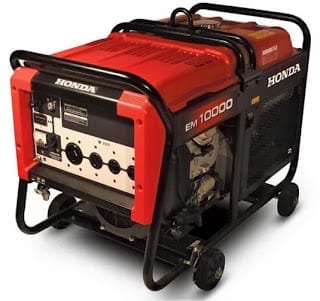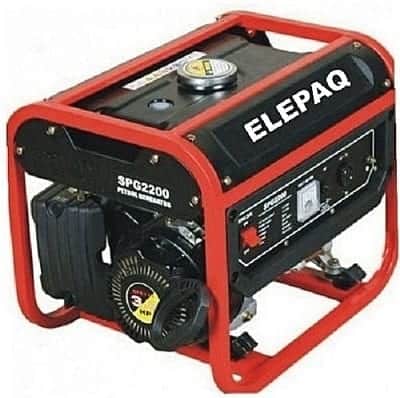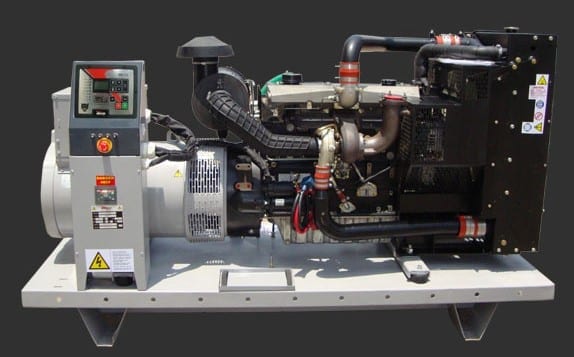Are you planning to buy an electric power generator? Are you wondering which brand of generator to buy? Do you want to know what factors to consider when buying portable electric power generators for your home, small, mid-sized, and large business? If your answer to any of the above questions is yes, then welcome, you are at the right site. The focus will be on portable power generators used in homes and small businesses as well as industrial grade generators.

Electric power generators supply standby power during a power failure. The first step in buying a generator is to understand the characteristics of power generators.
These characteristics are often called the generator rating. Knowing the important ratings of generators and how they affect their performance makes you a more informed buyer.
Generator Ratings
The following are some of the important ratings/characteristics of electric power generators:
- Output Voltage: This is the value of voltage supplied by the generator set. This should be between 210v to up to 250 volts for generators in Nigeria, in some countries it will be 110V or 120V
- Rated Power: (a.k.a. Running Capacity) This is the load that a generator can carry under normal operations. Note that generators are designed for standby supply and not for continuous usage at this power rating. This rating is in KVA or VA or W. KVA simply means 1000 VA. Hence, a 2.2 KVA generator is the same as 2200 VA while a 950 VA is the same as 0.95 KVA. Buy power generators with rated power above your need, so that you don’t exceed rated power
- Maximum Power: (Starting Capacity) This is the maximum load or power the generator can carry over a very short period (less than 30 minutes). This power must not be exceeded under any circumstances. Note that although generators can carry loads up to maximum power, we recommend you operate generators within rated power. Some dealers quote maximum power as rated power just to give you the impression you are buying a larger generator. Always ask to see the rated power and maximum power on the generator’s panel or spec sheet.
- Rated Output frequency: this tells you the frequency of your generator’s output voltage. In Nigeria, it must be 50Hz, in some countries it is 60Hz. When buying generators ensure rated frequency is similar to public power supply.
- Fuel type: Diesel (AGO) or Petrol (Gasoline)
- Recommended Engine Oil
- Presence or absence of an Automatic Voltage regulator (AVR), most generators come with an AVR, except for some very small ones
- Inverter Generator: this is a type of generator that works by converting the high voltage AC power directly into DC voltage, and converting it back again to clean AC voltage by using state-of-the-art circuitry. This makes it more energy-efficient, quieter, and more compact.
Other Characteristics of Generators include:
- Dimension: consider the available space for operating and storing the generator
- Starting method (excitation method): key (kick starter), recoil starter (rope & grip), or both. The key starter is easier to use but will cost more. We will recommend key start generators if your budget allows
- Portability Kit: Wheels, rollers, and handles. This makes moving your generators easier. Although they will cost more, we recommend generators with wheels or rollers and handles
- Generator Brands: Firman, Elepaq, Lutian, Thermocool, Sumec, Maxi, Tiger, Elemax, Senwei, Sumec Firman, Honda, Tec, Senci, Hyundai, Parsun, Yamaha, Tigmax, Elepon, Fuji, Jinling, Sunshow, Citizen, Osycris, Okayama, & so on. For industrial generators, you have Mikano, Lister, Perkins, Cummins, FG Wilson, Kipor, Hyundai, etc to choose from
With a good knowledge of the characteristics/ratings and features of generators, you are now in a good position to make a more informed choice.
Guide to Buying a Generator
Step 1: Identify the anticipated Generator load
The first thing to consider is the total and average load (power consumption) to be supplied by the generator. Your total load is the sum of power consumption of all electrical loads in your house or installation while your average load is a more realistic estimate of your power supply requirement.
A simple way of calculating your average load is as follows:
Determine the period of day you intend to use the power generator. Also, determine the period of day that you use the most load. This is usually at night for most people with TV, lights, computers, and refrigerators all on at the same time.
List all appliances that are usually on during your peak consumption period with their power ratings in brackets.
An example of a two-bedroom flat with a night peak consumption period may look as follows. Get the rating of your own gadgets from the manual or panel:
- TV (100w)
- DVD player/decoder (20w)
- Refrigerator (200w)
- One 36 watts energy efficient lamp (36w)
- Two 20 watts energy efficient lamps (40w)
- Two electric fans (160w)
- Personal computer with peripherals (550w)
- Contingency (100w)
- This gives a total of 1206w
Note that the power rating of a device may vary. Therefore, the ratings shown here are non-standard. Ratings of appliances are normally written on the back panel or/and in the user manual. Consult them for a power rating that applies to your gadgets.
Now that you know your anticipated load, you have enough information to determine what the generator rating should be. Generators will last longer if they are not operated at full load continuously for a long time.
In fact, electric power generators are better when operated most of the time at lower rated power, say half of the rated power. This is termed de-rating.
Once you have determined your total power requirement you then de-rate the generator rating by multiplying the total power by two, assuming you want to operate generators at half load. For the example shown above the rating of the de-rated generator will be 2,412w.
This means that a 2.5 KVA generator will comfortably handle the loading condition shown above. Note that the generator-rated power (not maximum power) should be greater than 2,412w.
This may look stupid but if you put your mind on your goal which is to buy a generator that will last, and keep in mind that you are working only with an estimated power consumption you might begin to see reason.
De-rating power generators will increase their useful life and save you from frequent maintenance costs. To De-rate a power generator also means that you can add more load to the generator for short periods, for example, you may want to iron your clothes.
De-rating also accounts for the higher starting power required by gadgets like refrigerators and freezers. Freezers and refrigerators usually require up to three times their rated power to start.
Estimating the ratings of generators to be so close to your loading requirement may lead to overloading when starting your gadgets, as some gadgets will require more than their rated power to start.
If the additional starting load causes loading to exceed the generator’s maximum loading, it could cause damage to the generator.
Since this calculation was done with rated power and not starting power, then you must ensure you turn off all gadgets before starting the generator.
After you turn on the generator, then turn on every gadget one after another. Do not turn on generators with everything on as the starting power required may be higher than the generator can support. This can lead to serious generator damage or frequent generator breakdowns.
It is also a good idea to turn on appliances with a high starting current first before other low-power appliances. This will ensure the gen set has enough capacity to start the appliances.
Another way
You must not know your anticipated load before buying a generator. Sometimes, you may decide to buy a generator you can afford and then turn on only appliances that can be powered by it during power failure.
This is okay as long as you will be disciplined enough to recognize when your generator is too loaded and shut down some appliances as soon as you notice the change of engine sound as a result of overload.
Best Generators by Capacity
Step 2: What Voltage & Frequency rating
It is now time to determine other ratings of a power generator. You must ensure that the generator is of the right voltage and frequency rating. In Nigeria, the voltage supply is about 220V, 50Hz.
Power generators of lower ratings will not be able to supply the necessary voltage to carry your gadgets. A higher rating can cause problems for your gadgets.
In general, the voltage and frequency rating of a power generator set must be compatible with that of the electric company and your gadgets.
Step 3: What Fuel Type
You should know the type of fuel required by the generator. Ensure that you can readily source the fuel within your environment. Most generator sets use either gasoline or diesel.
Some generators also offer the option of using cooking gas in addition to gasoline.
However, most generators used in the home require unleaded gasoline (petrol). Some are more flexible offering you an option of using gasoline blended with either ethanol, methanol, or methyl tertiary butyl ether (MBTE) up to a certain percentage volume.
These fuels when mixed with gasoline reduce your fuel cost and Carbon dioxide emission. However these fuels are not currently available in Nigeria in sufficient quantity, so most Nigerians will have to be using only gasoline for a while.
Most high-power generators use diesel or gas.
Step 4: What Recommended Engine Oil
You should also know the type of engine oil and how to apply it to your generators. The Tiger 650VA and 950VA generators require that you mix petrol and engine oil in the ratio of 50:1.
However, most generators of 1KVA and above will have a separate oil tank. Hence, for such a generator you mustn’t mix gasoline with engine oil.
In general generators with two-stroke engines require a mixture of fuel and engine oil, while four-stroke engine generators have separate crankcases for engine oil. Follow the instructions on the user manual of your generator.
Step 5: is Output Voltage Regulated?
You must now decide whether you require power generators with an in-built Automatic Voltage regulator (AVR) or not. Power generators with AVR will supply a stable voltage with no flicker.
This feature is recommended, although it is no longer an option these days as most generators now come with AVR. The smaller generators like Tiger 650VA and 950VA generators offer no automatic voltage regulation.
If you plan on buying these generators, you may also consider buying AVR for your gadgets. You can also manually control the voltage output.
Step 5: Generator Brands
The brand of generators does not really matter. The most important thing is to ensure that the generators meet your requirements and that the brand has a strong presence in your country.
Buying your generator from a brand with a strong presence in your country will ensure you can easily get help for maintenance and repair. Such electric generators will also come with a warranty with spare parts readily available.
If you are in Nigeria, here are some of the most popular generator brands for low-power applications in the home and small businesses: Firman, Elepaq, Lutian, Thermocool, Sumec, Maxi, Tiger, Elemax, Senwei, Sumec Firman, Honda, Tec, Senci, Hyundai, Parsun, Yamaha, Tigmax, Elepon, Fuji, Jinling, Sunshow, Citizen, Osycris, Okayama, etc.
For high and medium-power generators used in industrial and commercial applications, you can check out brands like Cummins, Perkins, Mikano, FG Wilson, Lister, Kipor, etc.
Step 6: How much will it cost?
Now that you know what you want it is now time to find out how much it will cost you. You have to do a market survey to check what your dream generator will cost you.
Before buying your power generator, you should browse online stores like Jumia and Konga, visit retail stores, or ask friends who have recently bought generators to find out the price of your dream generator. If after the survey you find out that you cannot afford your dream generator set do not settle for less.
Save or borrow to complete the cost. Some Nigerian banks offer credit purchases for power generators you can also take that option. A 2.5 KVA generator will cost between 200,000 Naira to up to 500,000 Naira depending on brand and features.
If you must compromise you must know what features to sacrifice. Do not compromise with the power rating of your dream generator.
If you must buy generators with lower power ratings make sure that you will be disciplined enough in order not to overload them.
Note that overload is the most popular cause of breakdown in power generators, prevent it and you will visit the mechanic only occasionally. You can readily compromise with the brand of generators.
As a guide to help you buy a generator here are estimates of generator prices. No specific model is mentioned. This is based on our extensive research on generator prices in Nigeria.
Note that the price of a generator will vary widely depending on whether it has features like kick-start, wheels, etc.
Generator Price (Compare Prices)
- 0.7KVA – 90,000 Naira to 190,000 Naira
- 1.2KVA – 170,500 Naira to 350,000 Naira
- 2.2KVA – 178,900 Naira to 590,000 Naira
- 2.5KVA – 200,000 Naira to 520,000 Naira
- 2.8KVA – 280,000 Naira to 750,000 Naira
- 3.2KVA – 300,000 Naira to 850,000 Naira
- 4.2KVA – 400,000 Naira to 990,000 Naira
- 5.5KVA – 520,000 Naira to 1,450,000 Naira
- 10KVA – 650,000 Naira to 4,000,000 Naira
Here is a more detailed list of Generator Price by model.
Step 7: Buy your dream Generator
With a good knowledge of your dream generator under your belt it is now time for the simplest part in buying generators sets which is well, buying a generator set.
Online stores like Jumia and Konga now makes buying generators very easy just go to the website and choose a good dealer to buy. You can just sit in the comfort of your home and order and these online stores will deliver to your home or business address.
When buying from Jumia, select a merchant with Jumia Express badge to ensure good quality product and good shopping experience. When shopping on Konga, buy from premium sellers for the same result.
If you decide to buy from brick n mortar store (i.e. physical stores), make sure you buy your generator from an accredited dealer and do not forget to collect your procurement receipt. Most accredited generators dealers will give up to a year warranty.
Before signing your procurement receipts or generators warranty agreement, you must ensure that the name on the receipt is the same as the name of the dealer you are buying from.
Do not buy from a dealer that does not have branded receipts. Ensure that all the details of the product are written on the receipt (Brand, model number, and serial number).
Open up the carton to see the product inside. Also, ensure that generators accessories like manual and spare spark plug(s), spark plug wrench and so on are also included.
Where to Buy Generator
You can buy power generators in Nigeria at Estendo, Jumia, Jiji, and Konga.
In Conclusion
Well, the process of buying generators may seem too cumbersome but if you follow it diligently you will surely buy a product that will stand the test of time. Make sure you do not compromise with the process, if you feel you cannot do it your self find people to help you accomplish any of the tasks that is challenging to you.
Related Generator Topics
- Beware of Generator Fumes, they kill
- How to Buy Refrigerator
- How to Buy Air Conditioner
- Best 5KVA Inverters
- Best 3.5KVA Inverters
- Sumec Firman SPG 3000E2 2.5KVA Generators
- Take the stress from refuelling your generators with Siphon pumps
- Best 1.5KVA Inverters
- Best Inverter Generators
- Honda Generator Dealers
- How to Buy TV
- Best Small and Portable Generators
- Best Small and Portable Diesel Generators
- Generator Maintenance
- Generator Dealers
- Prices of Power Generators
- How to Turn On a Power Generator
- Tiger Power Generator
- Elemax Power Generator
- How to Buy Inverter
- Sakr – Perkins GE Engine Generators
- Solar Inverter
- Cummins Generator Dealers
- Perkins Generator Dealers








